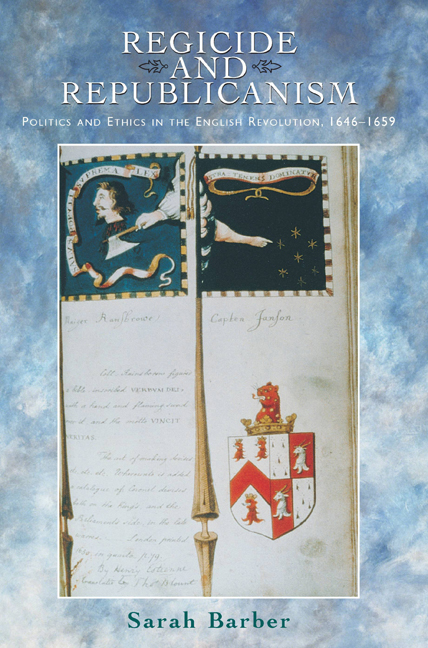Book contents
- Frontmatter
- Contents
- Preface
- List of Abbreviations
- Introduction: Regicide and Republicanism
- 1 Unparliamentary Language and the Dignity of the Crown
- 2 ‘A Mere Man’: Charles Levelled
- 3 The Expense of Blood and Treasure
- 4 King Ahab
- 5 Queen Justice
- 6 Government New Modelled?
- 7 The Engagement of Loyalty
- 8 The Active and the Passive Life
- Epilogue: The Good Old Cause
- Select Bibliography of Printed Sources
- Index
3 - The Expense of Blood and Treasure
Published online by Cambridge University Press: 03 October 2020
- Frontmatter
- Contents
- Preface
- List of Abbreviations
- Introduction: Regicide and Republicanism
- 1 Unparliamentary Language and the Dignity of the Crown
- 2 ‘A Mere Man’: Charles Levelled
- 3 The Expense of Blood and Treasure
- 4 King Ahab
- 5 Queen Justice
- 6 Government New Modelled?
- 7 The Engagement of Loyalty
- 8 The Active and the Passive Life
- Epilogue: The Good Old Cause
- Select Bibliography of Printed Sources
- Index
Summary
Finding a name by which to identify the activists which have emerged in the course of Chapters 1 and 2 is fraught with difficulty. Most seventeenth-century names were epithets which began fife as risible attacks coined through opposition. Titles were like mud, slung by hostile forces, but subsequently rationalised by proud and defiant adoption. In the summer of 1647 the main ‘parties’ were described as Royalists, Presbyterians, Independents and Covenanters, but during negotiations between them all, some noted a group in the Commons (the Indepen- dent-ultraists of Chapter 1), together with Levellers and agitators in the army (the ‘populist faction’ of Chapter 2), which constituted a separable party. Lucy Hutchinson thought of the emergent third group in terms of allies of, though not synonymous with, the Levellers, and declared her parliamentarian husband to have been sympathetic to their cause:
the two factions of presbytery and independency being so engaged to suppress each other, that they both ceased to regard the public interest; insomuch, that at that time a certain sort of public-spirited men stood up in the parliament and army, declaring against those factions and the ambition of the grandees of both … The lords, as if it were the chief interest of nobility to be licensed in vice, claimed many prerogatives, which set them out of the reach of common justice, which these good-hearted people would have equally to belong to the poorest as well as to the mighty; and for this and such other honest declarations, they were nicknamed levellers … men of sober principles, of honest and religious ends, and therefore hated by all the designing self-interested men of both factions.
Professing an ideology of responsibility for and towards the common weal, they opposed themselves to so-called private interest. They stood against privilege by birth, which seemed to license amorality, and were instead ‘good-hearted’, ‘honest’, ‘sober’ and ‘religious’. David Underdown placed particular emphasis on the word ‘honest’, in that it came to mean the ‘honest party’, the identifying mark of a particular political stance.
Previously, Underdown had referred to them as ‘extreme Independents’, but this does not satisfy, since this group sought to avoid the impression that they were allied to any pre-existent political faction.
- Type
- Chapter
- Information
- Regicide and RepublicanismPolitics and Ethics in the English Revolution, 1646–1659, pp. 66 - 95Publisher: Edinburgh University PressPrint publication year: 2020



